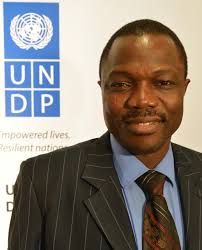By Dr. Ayodele Odusola
The Climate Adaptation Water Energy Programme (CAWEP) stands as a testament to the power of strategic intervention and community-driven development in building resilience in the face of climate change. Funded by the Foreign Commonwealth Development Office (FCDO) and implemented by the United Nations Development Programme (UNDP) in partnership with the Government of Zimbabwe, CAWEP is building the resilience of vulnerable communities against climate shocks through innovative and sustainable solutions.
Transformative Impact on Water, Energy Access, and Early Warning Systems
At its core, CAWEP seeks to ensure sustainable access to water, energy, and critical resources in the battle against climate adversity. The program has installed 18 Automated Weather Stations (AWS) across 16 districts, significantly enhancing national and localized weather forecasting capabilities. This infrastructure empowers communities with timely weather and climate information (through text messages and WhatsApp), enabling better planning and response to climatic events. Additionally, boreholes have been installed at clinics, schools, and public ablution facilities, providing reliable access to clean water and improving health and sanitation outcomes.
During a recent visit from 23-26 July 2024, the UNDP Resident Representative, Dr. Ayodele Odusola, and the British Embassy Development Director and Deputy Ambassador, Dr. Jo Abbot, observed significant progress at the Hakwata project site. The completed 200 kWp solar PV and 915 kWh capacity battery bank mini-grid provides sustainable energy to 105 connections, including households, shops (such as supermarkets, carpentry, and welding), a school, and a clinic, along with streetlights operating each night. This infrastructure supports essential services and economic activities, showcasing how renewable energy initiatives, combined with improved water access, foster community livelihoods, resilience, and development.
Empowering Women and Youth
A notable feature of CAWEP is its focus on gender equality and social inclusion. The program has trained 1087 women in Village Savings and Lending (VSAL), significantly empowering them economically. By prioritizing women-headed households for biogas digestor installations and involving women in community governance structures, CAWEP ensures that women are not only beneficiaries but also key actors in climate resilience efforts.
One beneficiary, Enia Chikweshe, a 43-year-old widow with four children, highlighted the transformative impact of biogas digestors on her daily life. She no longer needs to trek long distances for firewood, improving her health and providing extra income through a vegetable garden fertilized with biogas slurry.
Building Resilient Agricultural Practices
CAWEP’s irrigation infrastructure projects have transformed agricultural practices in targeted districts. The development of irrigation schemes and horticulture gardens has improved food security and nutrition while also creating green jobs. CAWEP’s irrigation infrastructure projects span across 130 hectares of agricultural land, directly benefiting nearly 2,500 people in the targeted districts. This transformation not only enhances agricultural productivity but also empowers households to improve food security, nutrition, and income generation. The development of these irrigation schemes has created green jobs and increased resilience, particularly in drought-prone areas, by ensuring reliable access to water for both household and productive use.
Effective Use of Climate Information
The dissemination of weather and climate information through Automated Weather Stations (AWS) and SMS systems has reached over 171,000 people, significantly improving their capacity to plan and respond to climatic changes. The translation of forecasts into local languages and the training of local stakeholders in data analysis and interpretation have been crucial in making climate information accessible and actionable at the grassroots level. In addition, the AWS connects local weather context to the national weather information management system.
Challenges and Future Directions
Despite significant achievements, the program faces challenges such as environmental risks posed by El Niño and infrastructural vulnerabilities. For instance, the road network to Hakwata is poor, affecting accessibility during the rainy season. However, CAWEP’s proactive risk management strategies, including promoting climate-smart agriculture and strengthening early warning systems, are commendable efforts to mitigate these challenges.
CAWEP ensures sustainability by training Infrastructure and Electric Minigrid Committees in technical and financial management. This enables local communities to maintain infrastructure and establish business models for covering operational costs, including service payments. By using Village Savings and Lending Schemes (VSLs) to fund maintenance and encouraging payment for energy use, CAWEP fosters ownership and accountability. Additionally, training on climate information and early warning systems empowers communities to make informed decisions, building resilience and supporting long-term self-reliance.
Conclusion
The CAWEP program exemplifies a holistic approach to climate adaptation, integrating technological innovation with community empowerment. Its successes underline the importance of multi-stakeholder collaboration and inclusive development in building resilient communities. As the program progresses, its impact on Zimbabwe’s climate resilience will likely serve as a model for similar initiatives across the globe.
The recent visits to project sites in Hakwata, Chivi, and Insiza demonstrated the tangible impacts of CAWEP. Stakeholders emphasized the importance of sustainability and continued collaboration to achieve long-term development goals. The partnership between UNDP, FCDO, and the Government of Zimbabwe has been pivotal in driving the program’s success, fostering a scalable and replicable model for providing decentralized energy to marginalized communities.
Dr. Ayodele Odusola is the UNDP Resident Representative, Zimbabwe. Views expressed in this article are entirely his.








